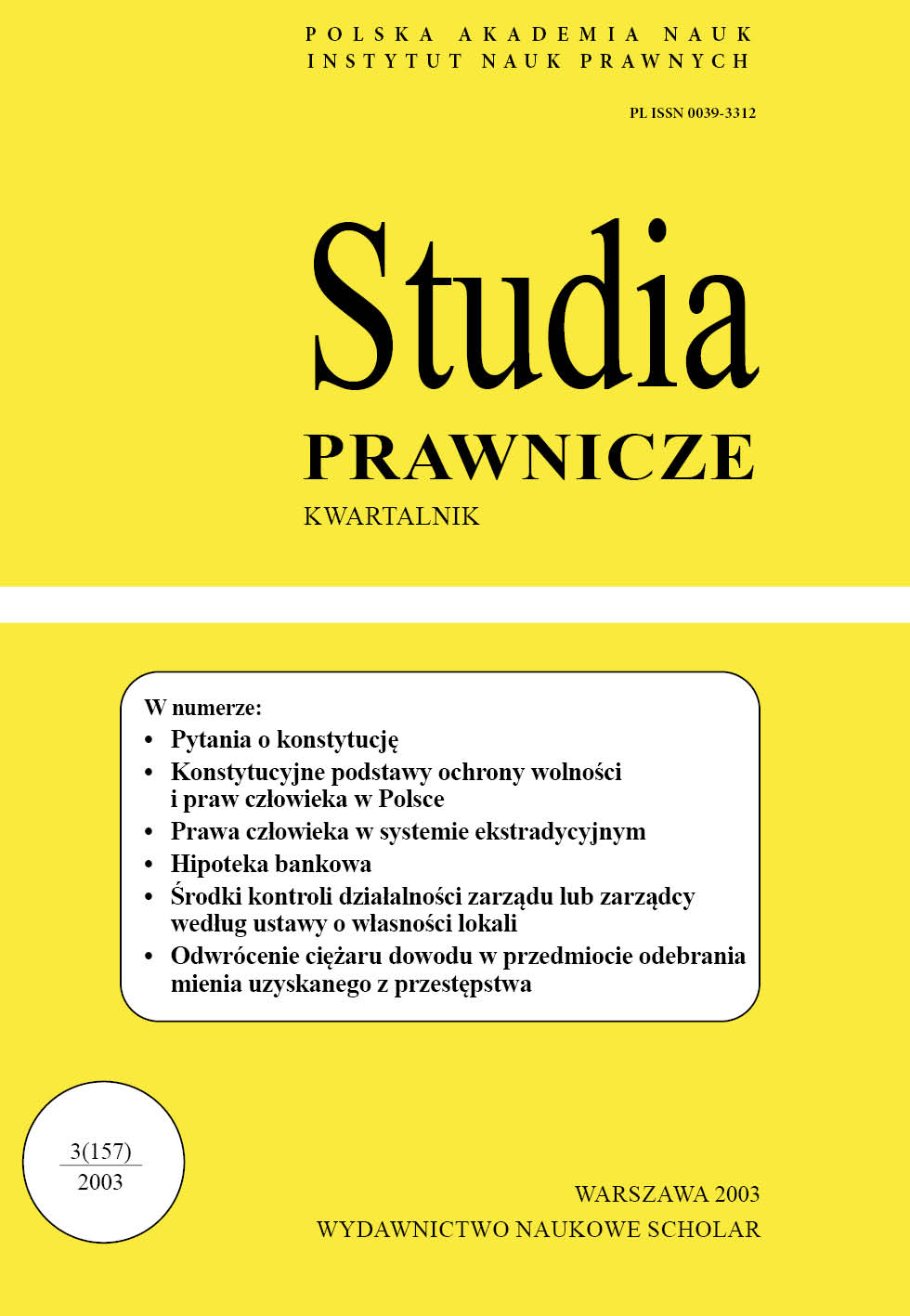Pytania o konstytucję
Questions about the constitution
Author(s): Maria Kruk, Adam Łopatka, Wojciech Sokolewicz, Jan Wawrzyniak, Roman Wieruszewski, Waldemar Wołpiuk, Teresa Górzyńska, Jacek Falski, Ewa Popławska, Jerzy Rychlik, Katarzyna Kubuj, Marzena LaskowskaSubject(s): Law, Constitution, Jurisprudence
Published by: Instytut Nauk Prawnych PAN
Keywords: Constitution of the Republic of Poland; axiology; human rights; parliament; electoral law; executive authority; public administration; National Broadcasting Council; court authority; territorial self-
Summary/Abstract: After five years of the Constitution of the Republic of Poland, a theme is emerging in the political world, in the press, in intellectual circles and in academia to assess the social role and legal effectiveness of this act in the process of governance and in solving the problems of the state and society. Two particular circumstances make this discussion go beyond purely academic considerations. Firstly, Poland's accession to the European Union is a process requiring the adaptation of the Polish legal order to EU norms and standards, which raises questions both about the compatibility of the Constitution with some of them in quite specific matters, and about its capacity for future harmonious “coexistence” with European law. Secondly, there is the increasingly widespread decline in public trust in political elites. Under these conditions, reaching out to the Constitution is a natural social reflex of hope that a remedy will be found in its amendments. However, views in this area do not converge either on the necessity of change per se or on its scope. On the one hand, the proposals only concern changes to certain principles, e.g. electoral law, while on the other, there are calls for radical changes, e.g. moving to the “Fourth Republic”. A stable constitution is undoubtedly an intrinsic value to be guarded. It provides certainty and confidence in fundamental Constitutional principles and perpetuates the legal order in the state. is a consistent criterion for assessing the functioning of government, and is a constant reference point for citizens' rights. From these important rationales also results the conviction that no changes should be undertaken, especially when not based on deep analysis. In valuing these beliefs, however, such an analysis must be undertaken. First and foremost, it should concern the social situation and the political conditions in which the constitution operates, answering the question of what it can be “blamed” for and which of its provisions can be held responsible for, and to what extent the legislation, and in particular its deficiencies, which do not allow for the full application of the constitution, constitutional practice or even circumstances outside the law are to blame. Then, on this basis, constitutional institutions and procedures can be reviewed in order to ascertain which ones should be corrected and what this correction – under specific conditions – is able to achieve. A broad and in-depth analysis should be accompanied by a demand for only necessary adjustments (after all, when weak government is the problem, it does not have to be abolished straight away), while avoiding untested, radical experiments. It should also be remembered that the constitution, even if fundamental, is only one of the building elements of democracy. Equally important is good legislation and political practice. Not to mention a good knowledge of the text of the constitution itself, and even here we often observe failures. As prof. K.W. Kumaniecki wrote in 1927: “For the Constitution is merely walls. And the life that is meant to thrive between them can always be arranged in such a way that it is healthy and full of strength even within uncomfortable walls”. This text is an attempt to open a discussion, to review the text of the Polish Constitution of 7 April 1997 precisely from the point of view of the relevance of its provisions and their functioning in public life. It is the intention of the authors to identify those areas that should be subjected to consideration as to whether dysfunctional elements can be found within them. The premise, however, is not to propose changes: neither to specific legislation, nor radical systemic reforms. Moreover, the authors do not even indicate that they know the correct or even right solutions. They only pose questions on selected key issues.
Journal: Studia Prawnicze
- Issue Year: 157/2003
- Issue No: 3
- Page Range: 5-34
- Page Count: 30
- Language: Polish

